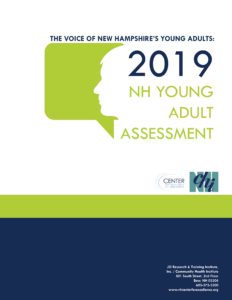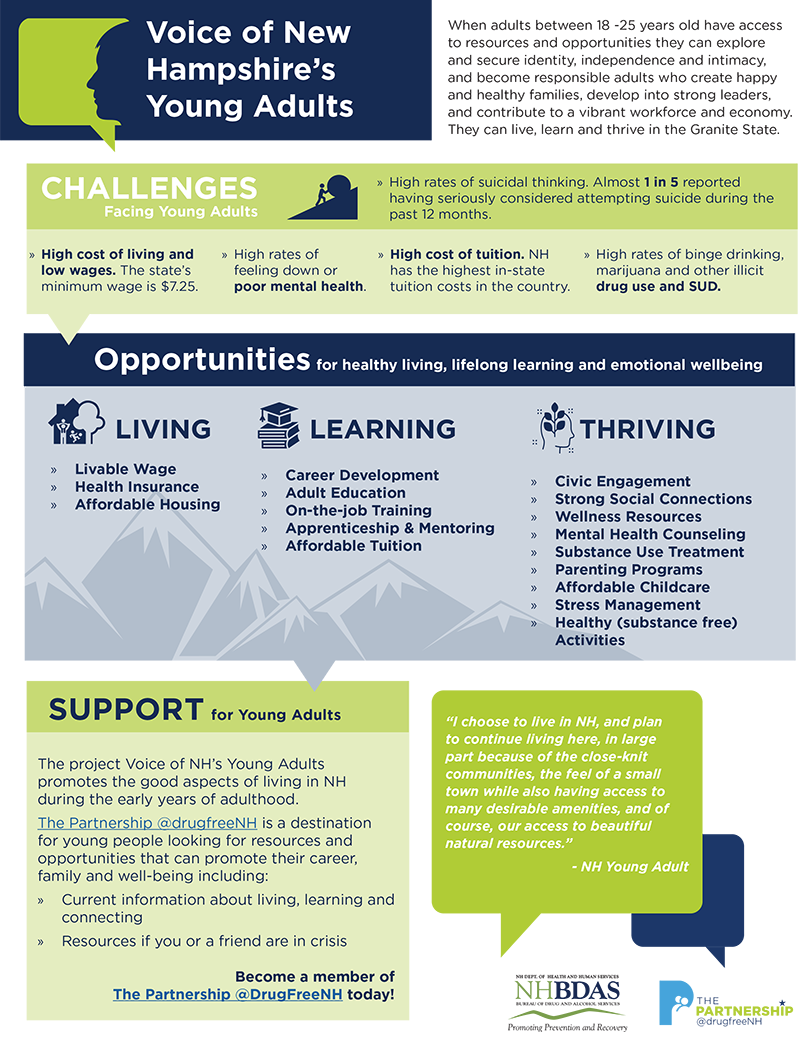For Young Adult Providers
New Hampshire Cares About Young Adults
This page shares what we learned when we talked directly to New Hampshire (NH) young adults about what makes the transition to adulthood in the Granite State challenging and exciting. We also discuss what we can do to support young adults develop lifelong healthy habits and avoid the negative consequences of alcohol, tobacco and other substance misuse.
We know that when adults between 18 – 25 years old have access to resources and opportunities, they can explore and secure identity, independence, and intimacy. They can become responsible adults who create happy and healthy families, develop into strong leaders, and contribute to a vibrant workforce and economy. They can live, learn, and thrive in the Granite State.
As prevention professionals, healthcare providers and caring adults, we can support young adults by connecting them with resources and opportunities during this time of transition.
A time of transition
However diverse and individualized their experiences, young adults are in a defining stage of their lives as they transition from adolescence and dependence to adulthood and independence. We know from developmental research that they are still developing physically, psychologically, and socially through the age of 25, with the most complex executive functioning forming in late adolescence just as they are leaving home, attending college, considering trades and careers, and forming lasting friendships.
We know that these transitions can be STRESSFUL. They can impact and be impacted by mental health and substance use. Life’s transitions without proper preparation and support can be challenging for anyone leading to unhealthy and unsafe ways of coping. Stress can pile up and so can the negative consequences of substance use and mental health problems.
State and national surveys show that NH young adults use all types of substances at higher rates than their peers in other New England states and across the nation. They also struggle with mental health issues.
Strengths and Struggles
Key Findings from the 2019 NH Young Adult Needs Assessment
To better understand the root causes of substance use and mental health problems among NH’s young adults, a statewide assessment was conducted in 2019. A total of 2,694 adults aged 18-30 across the state, described what excites and what frustrates them about living, learning, and thriving in NH, and where they could use a little extra support.

Living and Learning
- Opportunities to build a career and earn an income to support themselves and their families are sources of excitement and hope for the future.
- Frustration with the high cost of living in NH, low wages, and college tuition costs.
- Financial issues present significant barriers to accomplishing their goals.
Thriving - Developing Wellness
- ⅔ report that they feel good or excellent about their general health.
- Self-reported good health declines with age. A significantly higher percentage of those aged 26-30 report fair health when compared to those aged 18-20.
- There are significant differences in perception of health by financial status. Among those who live comfortably, 31% report excellent health compared to 8% of those who do not meet basic expenses.


Thriving - Making Connections
- Friends are the most common source of social support reported by young adults followed by a significant other and a parent/ guardian/ caregiver.
- Thirty-one percent of young adults who reported having no one to talk to had serious thoughts of attempting suicide, compared to 13.2% of young adults who did have someone to talk to.
- Financial status had a significant impact on how supported young adults felt.
- Relationships and connection to the community are linked with excitement and hope for the future.
Thriving - Elevating Their Voices
- NH Young Adults report that they are excited and hopeful about their voices being heard, generational changes, and the increased involvement of young adults in government and politics.
- They believe they can affect positive change; particularly in areas of environmental policy and diversity and inclusion.

Supporting Young Adults in NH
We can all make an impact in supporting young adults. In response to the findings of the Young Adult Needs Assessment, the NH Bureau of Drug and Alcohol Services has been building the infrastructure to support the health and wellness of NH young adults. Together, we can continue to build and strengthen this infrastructure.
Explore the following resources to learn how you can make a difference.
Health Campaigns Reaching Young Adults
 Binge Free 603 – A health campaign featuring real NH young adults sharing their personal reasons for avoiding excessive drinking. This website also provides resources for individuals considering a break from alcohol.
Binge Free 603 – A health campaign featuring real NH young adults sharing their personal reasons for avoiding excessive drinking. This website also provides resources for individuals considering a break from alcohol.
![]() Today Is For Me – A public health campaign designed to educate and motivate those who are thinking about getting pregnant and who are already pregnant to take steps to ensure a healthy pregnancy. Visit the campaign website for empowering lifestyle resources on making healthy choices, like avoiding all types of alcohol and cannabis before, during and after pregnancy.
Today Is For Me – A public health campaign designed to educate and motivate those who are thinking about getting pregnant and who are already pregnant to take steps to ensure a healthy pregnancy. Visit the campaign website for empowering lifestyle resources on making healthy choices, like avoiding all types of alcohol and cannabis before, during and after pregnancy.
Resources to Support Young Adults
Young Adult Strategies Coordinators in each region of NH – These professionals are actively working to support and connect young adults to proven prevention strategies that prevent or delay substance use and promote healthy living, lifelong learning, and emotional wellbeing. Connect with the Young Adult Coordinator in your region to see how you can collaborate.
Regional Public Health Networks and Advisory Councils – Many of the state’s Public Health Networks making efforts to learn more about the young adults in their area by conducting local focus groups and listening sessions.
TOGETHER we can promote resources for adults between 18 – 25 years that facilitate these transitions. Check out our young adult webpage that connects people to resources, support, and services to develop healthy solutions. It is a destination for young people looking for resource and opportunities that can promote career, family and well-being including:
- Current information about living, learning, and connecting
- Resource for someone in a crisis
TOGETHER we can advocate for improving the factors that influence the health of young adults.


